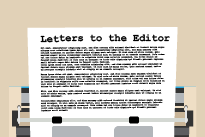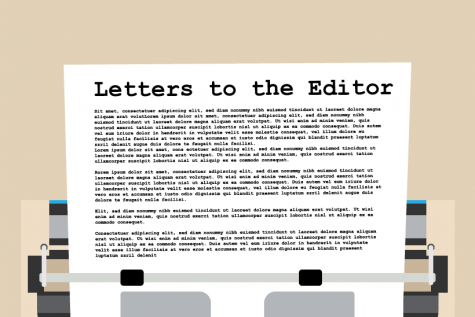Letters to the Editor
Free speech for me but not for thee
It’s easy for the American people to assume that all the chaos and uncertainty surrounding American politics will dissolve as soon as an American President is chosen. But easy is not correct; with the resolution of the election fast approaching, only more chaos will ensue. Only more people will be lost in the panic and only more attacks on foundational American ideals will greet us. The biggest problem with modern day politics is not political. It is societal. Free speech is being shut down, with the greatest attacks coming through our schools — throughout academia, fledgling voices are being silenced.
Dissenters from “correct liberalism” are told they are wrong on partisan issues, not because they are factually incorrect, but because in the eyes of teachers and deans, their opinion is “untrue.” Therein lies the problem: who decides which opinion is correct? Can opinions even be correct? The answer is no — there is no great arbiter of correct opinions because opinions can not be right or wrong. Opinions just are, they exist as a stance, one supported by and dissented against by facts. If any setting exists where this realization should be acknowledged (if not embraced), it should be the classroom. I’ve always been fond of sentiments that nod towards schools as places that teach you how to think, not what to think. My fondness is not shared by those at college campuses or even at our own school.
Colleges head the charge against free speech. They have routinely stopped speakers at college campuses, calling the subject matter divisive and denying their students access to another opinion. Brown University disinvited Janet Mock because of her affiliation with a pro-Israel group, California State University at LA barred Ben Shapiro because they disliked his conservative views, California State University at Berkley stopped Nicholas Dirks from speaking because he “wasn’t doing enough for black students” and the University of Chicago shut down Anita Alverez because she refused to openly endorse the Black Lives Matter movement. The list goes on — it goes so far that for me to include them in this article would take some 500 words.
Those mentioned above are high profile adults; they are persons of influence, people with an audience, speakers who know how to get coverage on the wrongdoings leveled at themselves. The student body at these colleges are not yet so entitled. Students don’t get stories written on them when their teachers refuse to accept essays that take an unpopular stand. Students have nowhere to turn when their professors decide that leftism is correct and conservatism is evil. The students who are the future voice and moral conscience of our country are left without refuge in a college scene, white washed with revisionist history and partisan ideals. How can one be taught to think for themselves when their college professors think for them?
The National Security Agency did an investigation into college professors’ political ideologies: they found that among the 9,000 faculty that constitute the communications staffing of the 51 top colleges in the United States, the ratio of Democrats to Republicans was 108 to roughly 0. More so than this, 78% of colleges have 1 or fewer Republican professors employed. George Mason University economics professor Walter E. Williams, Ph.D. understands this problem fluently — “Many professors spend class time indoctrinating students with their personal political views,” he said. “Telling students what to think … instead of how to think.”
On a highschool level, I myself have seen the effects of the one sided discussion at Hagerty. As a student with obvious political views and perhaps a bit less of a filter than I should have, I am routinely the subject of chastisement from teacher and student alike. Criticism from the student body, no matter how untrue or derogatory, is fine- but I find fault with teachers acting in the same way. I have been told to not speak in class, given referrals for simply stating my opinion, called racist and sexist, publicly admonished and given inferior grades all because of my beliefs. And these beliefs are not racist nor worthy of such drastic action- they simply exist, and by my mere expression of them I must be expelled from the classroom. As I write this today I think of multiple specific instances of which I would love nothing more than to relay. My hands are bound because the repercussions of such actions would be so sudden and severe that to publish them would be scholarly suicide for myself. And that’s the problem- I can’t speak in class because of certain teachers and I can’t speak of teachers outside of class because of the power they wield in their small fiefdom. So who decides what’s controversial? Who gets to be the great arbiter of truth, of what’s allowed and what’s not? I finally found my answer — it’s my teachers.
Whether it be on a college campus or in a highschool classroom, we the students have an obligation, not only to our country, but to ourselves. I don’t care how your politics or personal opinions fall. I don’t even care if you have political opinions or not. What I do care about, more than anything else I’ve written, is that you know how to stand up for yourself and hold firm to an unpopular belief. That you can have a right to believe it.
We are the future of our country. Just make sure it is truly ours.
All content is soley from the guest writer. The Hagertyjourn staff reserves the right to decide what letters will be published. If you are interested in submitting a letter to our column, email a Google Doc/Microsoft Word document to [email protected]
Your donation will support the student journalists of Hagerty High School. We are an ad-free publication, and your contribution helps us publish six issues of the BluePrint and cover our annual website hosting costs. Thank you so much!



